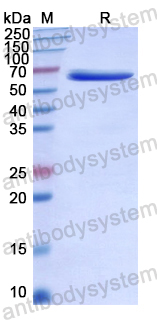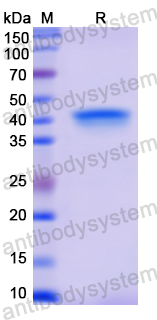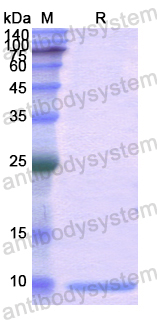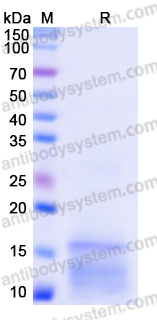Catalog No.
YHJ42001
Expression system
E. coli
Species
Homo sapiens (Human)
Protein length
Gly48-Gln385
Predicted molecular weight
63.11 kDa
Nature
Recombinant
Endotoxin level
Please contact with the lab for this information.
Purity
>90% as determined by SDS-PAGE.
Accession
Q96RI0
Applications
ELISA, Immunogen, SDS-PAGE, WB, Bioactivity testing in progress
Form
Lyophilized
Storage buffer
Lyophilized from a solution in PBS pH 7.4, 0.02% NLS, 1mM EDTA, 4% Trehalose, 1% Mannitol.
Reconstitution
Reconstitute in sterile water for a stock solution. A copy of datasheet will be provided with the products, please refer to it for details.
Shipping
In general, proteins are provided as lyophilized powder/frozen liquid. They are shipped out with dry ice/blue ice unless customers require otherwise.
Stability and Storage
Use a manual defrost freezer and avoid repeated freeze thaw cycles. Store at 2 to 8°C for frequent use. Store at -20 to -80°C for twelve months from the date of receipt.
Alternative Names
Proteinase-activated receptor 4, Thrombin receptor-like 3, PAR-4, PAR4, F2RL3, Coagulation factor II receptor-like 3
7,4'-dimethoxy-3-hydroxyflavone, a protease-activated receptor 4 (PAR4) inhibitor with antioxidant activity, ameliorates diabetic endothelial dysfunction., PMID:40501374
Role of Liver Kinase 1B in Platelet Activation and Host Defense During Klebsiella pneumoniae-Induced Pneumosepsis., PMID:40332331
Attenuation of Atherosclerosis With PAR4 Deficiency: A Potential Role of Hematopoietically Expressed PAR4 in Atherosclerosis-Brief Report., PMID:40270259
Elderly patients are hyperresponsive to potent P2Y12 inhibitors., PMID:40177222
Soluble CD13 is a potential mediator of neutrophil-induced thrombogenic inflammation in SARS-CoV-2 infection., PMID:40168094
PAR2 Serves an Indispensable Role in Controlling PAR4 Oncogenicity: The β-Catenin-p53 Axis., PMID:40141421
UPF1 Alleviates Myocardial Ischemia-Reperfusion Injury by Regulating SMURF2-Mediated Ubiquitination Degradation of FOXA2., PMID:39962965
Endothelial protease-activated receptor 4: impotent or important?, PMID:39935714
Mice with reduced protease-activated receptor 4 reactivity show decreased venous thrombosis and platelet procoagulant activity., PMID:39798922
Modulation of persistent bladder pain in mice: The role of macrophage migration inhibitory factor, high mobility group box-1, and downstream signaling pathways., PMID:39539469
Mice with Reduced PAR4 Reactivity show Decreased Venous Thrombosis and Platelet Procoagulant Activity., PMID:39463946
Discovery of quinazoline-benzothiazole derivatives as novel potent protease-activated receptor 4 antagonists with improved pharmacokinetics and low bleeding liability., PMID:39442337
Acetaminophen Overdose Reveals PAR4 as a Low-Expressing but Potent Receptor on the Hepatic Endothelium in Mice., PMID:39360412
Thrombin receptor PAR4 cross-activates the tyrosine kinase c-met in atrial cardiomyocytes., PMID:39283528
Attenuation of Atherosclerosis with PAR4 Deficiency: Differential Platelet Outcomes in apoE -/- vs. Ldlr -/- Mice., PMID:39211209
METTL3 aggravates renal fibrogenesis in obstructive nephropathy via the miR-199a-3p/PAR4 axis., PMID:39182553
Acetaminophen Overdose Reveals Protease-Activated Receptor 4 as a Low-Expressing but Potent Receptor on the Hepatic Endothelium., PMID:38895465
STING Contributes to Pulmonary Hypertension by Targeting IFN and BMPR2 Signaling through Regulating of F2RL3., PMID:38864771
Protease activated receptor-4: ready to be part of the antithrombosis spectrum., PMID:38814792
Elevated protease-activated receptor 4 (PAR4) gene expression in Alzheimer's disease predicts cognitive decline., PMID:38761538
Direct neuronal protection by the protease-activated receptor PAR4 antagonist ML354 after experimental stroke in mice., PMID:38760890
MIF-Modulated Spinal Proteins Associated with Persistent Bladder Pain: A Proteomics Study., PMID:38674069
The thrombin receptor PAR4 supports visceral adipose tissue inflammation., PMID:38652276
Discovery of Protease-Activated Receptor 4 (PAR4)-Tethered Ligand Antagonists Using Ultralarge Virtual Screening., PMID:38633591
Discovery of 2,3-Dihydro[1,4]dioxino[2,3-g]benzofuran Derivatives as Protease Activated Receptor 4 (PAR4) Antagonists with Potent Antiplatelet Aggregation Activity and Low Bleeding Tendency., PMID:38552183
A mouse model of the protease-activated receptor 4 Pro310Leu variant has reduced platelet reactivity., PMID:38508397
Discovery of Potent and Selective Quinoxaline-Based Protease-Activated Receptor 4 (PAR4) Antagonists for the Prevention of Arterial Thrombosis., PMID:38385264
Vitamin D3 improved hypoxia-induced lung injury by inhibiting the complement and coagulation cascade and autophagy pathway., PMID:38166725
MicroRNA-26a alleviates tubulointerstitial fibrosis in diabetic kidney disease by targeting PAR4., PMID:38164021
Decreased platelet activation predicts hepatic decompensation and mortality in patients with cirrhosis., PMID:38150294
A Mouse Model of the Protease Activated Receptor 4 (PAR4) Pro310Leu Variant has Reduced Platelet Reactivity., PMID:38077081
The Influence of Smoking and Occupational Risk Factors on DNA Methylation in the AHRR and F2RL3 Genes., PMID:38051301
Lumbosacral spinal proteomic changes during PAR4-induced persistent bladder pain., PMID:38036085
Role of protease-activated receptor 4 in mouse models of acute and chronic kidney injury., PMID:38031732
Antiplatelet strategies: past, present, and future., PMID:38000851
Microscopic in-situ analysis of the mucosal healing around implants treated by protease activated receptor 4-agonist peptide or perpendicularly protruded type I collagen in rats., PMID:37737549
PAR4 Inhibition Reduces Coronary Artery Atherosclerosis and Myocardial Fibrosis in SR-B1/LDLR Double Knockout Mice., PMID:37675637
The C-Type Lectin Receptor CD93 Regulates Platelet Activation and Surface Expression of the Protease Activated Receptor 4., PMID:37669782
The predominant PAR4 variant in individuals of African ancestry worsens murine and human stroke outcomes., PMID:37471144
First-in-human study to assess the safety, pharmacokinetics, and pharmacodynamics of BMS-986141, a novel, reversible, small-molecule, PAR4 agonist in non-Japanese and Japanese healthy participants., PMID:37394920
Electroacupuncture Relieves Visceral Hypersensitivity via Balancing PAR2 and PAR4 in the Descending Pain Modulatory System of Goats., PMID:37371401
Species Differences in Platelet Protease-Activated Receptors., PMID:37176005
Platelets mediate acute hepatic microcirculatory injury in a protease-activated-receptor-4-dependent manner after extended liver resection., PMID:36716976
Oligosaccharide Blocks PAR1 (Proteinase-Activated Receptor 1)-PAR4-Mediated Platelet Activation by Binding to Thrombin Exosite II and Impairs Thrombosis., PMID:36519467
C1-inhibitor influence on platelet activation by thrombin receptors agonists., PMID:35996317
PAR-Induced Harnessing of EZH2 to β-Catenin: Implications for Colorectal Cancer., PMID:35955891
Platelet protease activated receptor 4 (PAR 4) receptor genotype is associated with an increased risk of preterm birth., PMID:35815338
Establishment of Biomimetic Soft Tissue Integration with the Surface of Zirconia Fused with Platelet-Activating Peptide., PMID:35806723
New oral protease-activated receptor 4 antagonist BMS-986120: tolerability, pharmacokinetics, pharmacodynamics, and gene variant effects in humans., PMID:35758258
Discovery of 7, 4'-dimethoxy-3-hydroxyflavone as a protease-activated receptor 4 antagonist with antithrombotic activity and less bleeding tendency in mice., PMID:35752281





